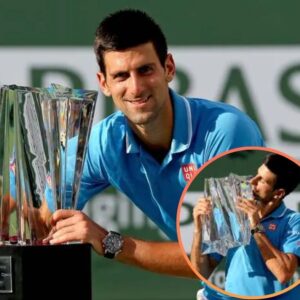
Would a peak Roger Federer have beaten a peak Novak Djokovic?
It is one of the few questions we will never get an answer to as the most glorious era in the history of the men’s game edges towards a conclusion.
Djokovic’s army of violently passionate fans on social media always run away from this debate as they are quick to insist the only records that matter are the fact that their man has more Grand Slam titles, more weeks as world No 1 and a winning record against Federer.
Yet that is not the point in question here.
Instead, this is a debate that cannot be settled as the version of Federer who dominated the game in the mid-2000s never played the finished product that Djokovic became at the start of the following decade.
FEDERER’S PEAK YEARS
Between 2004 and 2007, Swiss maestro Federer dominated the men’s game in thrillingly beautiful fashion.
He won eight Grand Slam titles over those three years and was runner-up in four finals at the majors during that period.
Essentially, a young Rafael Nadal was the only player who could give him a game when it mattered most, with a youthful Djokovic no match for Federer during this period.
READ MORE: Novak Djokovic could face a fall in the tennis ranking he endorses
Federer beat Djokovic in their first four meetings between 2006 and 2007 and he also won their first Grand Slam Final meeting at the 2007 US Open in straight sets.
These were arguably Federer’s peak years, with Djokovic showing evidence that he could challenge him with a win in the 2008 Australian Open semi-finals.
DJOKOVIC’S PEAK YEARS
Djokovic’s first real golden year came in 2011 when he claimed three Grand Slam titles and won 70 of his 76 matches for a win percentage of 92.1%.
He beat Federer four times during that dominant season to confirm his dominance over the Swiss star, but he did lose against him in a compelling French Open semi-final.
This was the year when Djokovic went from being a top player into something special and a real contender to the title of the greatest player in his era.
THE FINAL CHAPTERS
Federer had a resurgence in form in 2017, as he came back from what appeared to be a career-threatening injury and started to win Grand Slam titles all over again.
This was also a year when Djokovic lost his winning touch, as he didn’t get past the quarter-finals in any of the four Grand Slams.
He didn’t play the resurgent Federer in 2017 in what would have been a fascinating contest, as it may have given a more accurate reflection of the two players’ levels at the back end of their careers.
We did get a chance to see the remodelled Federer taking on Djokovic at the 2019 Wimbledon final, when the Serbian won a fifth-set tie break after he saved two match points against a veteran opponent.
THE VERDICT
There is no clear answer to this debate as the most dynamic and dominant Federer did not get a chance to compete against Djokovic at his peak.
The Federer of 2004 and 2005 was so polished and immaculate that he would have given any player in history trouble, with the brilliance of his tennis hard to break down.
This was when his serve was ripping through the court as quickly as his incredible forehand, with the aura he carried on the court beating many opponents before the warm-up.
Throw forward to Djokovic’s ultimate winning year of 2011 and you have a champion with no flaws in his game and an aura that was as crushing as Federer’s.
Who wins in a battle between peak Federer and vintage Djokovic?
It is a question that will be tainted by your loyalties to each player, but Federer was sublimely flawless in his mid-20s and that version of brilliance may have been a little too much for any player in the history of the game.
News
Will Rafael Nadal Face Novak Djokovic and Jannik Sinner at Indian Wells?
Rafael Nadal, the 22-time Grand Slam winner, is poised to make a return to the tennis court after overcoming his recent injury setback. His comeback has been…
Does Novak Djokovic Have Tattoos?
The ATP tour since 2003 has seen different versions of Novak Djokovic. Since his teens, Djokovic has constantly evolved to meet the needs of the game. His playing…
Novak Djokovic names his favourite Masters event – ‘One of the best tournaments in the world without a doubt’
Novak Djokovic has won the most ATP Masters 1000 titles and he is also the only player to have achieved a Career Golden Masters so he is…
Novak Djokovic and Rafael Nadal Break the Internet With Their Camaraderie en-Route to the USA
While Rafael Nadal and Novak Djokovic‘s battles on the court are of much renown, their latest meeting did not take place on the court. Instead, the King of Clay met…
Novak Djokovic Speaks Out: Horrifying Statement Strikes Away Fear in His Opponents.
Novak Djokovic’s presence on the Indian Wells practice courts this week should send a shiver of concern down the spines of his rivals. The world No 1…
‘Roger Djokovic Is the Greatest’ – IShowSpeed Snubs Rafael Nadal in His Hysterical Debut on Tennis’
Darren ‘IShowSpeed’ Watkins Jr. was recently spotted reflecting on his love for the racket sport during his visit to Doha to attend the Qatar Open. The popular…
End of content
No more pages to load











